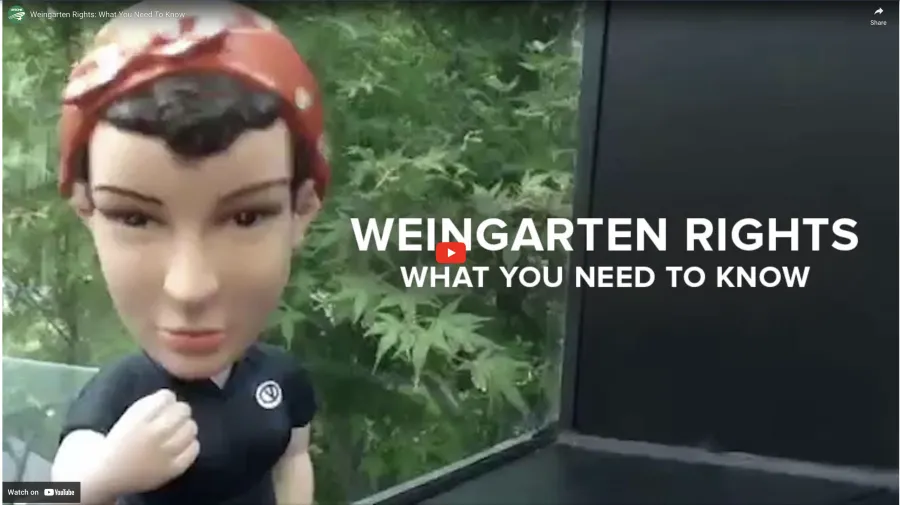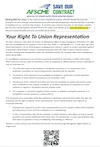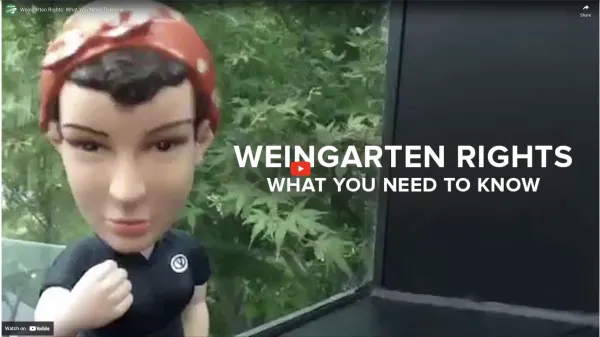Right to Representation

Proactively Assert Your Weingarten Rights

Q. What is my Right to Representation?
As a union member, you have Weingarten rights during investigatory interviews. Unionized employees have the right to have a steward present during a meeting with management when the employee believes the meeting might lead to disciplinary action being taken. If this is happening, you should call your steward, local officer or representative immediately.
Source: AFSCME Local 2384
Q. What is an Investigatory Interview?
An investigatory interview is one in which a Supervisor questions an employee to obtain information which could be used as a basis for discipline or asks an employee to defend his/her conduct. If an employee has a reasonable belief that discipline or discharge may result from what s/he says, the employee has the right to request Union representation.
Examples of such an interview are:
- The interview is part of the employer's disciplinary procedure or is a component of the employer's procedure for determining whether discipline will be imposed.
- The purpose of the interview is to investigate an employee's performance where discipline, demotion or other adverse consequences to the employee's job status or working conditions are a possible result.
- The purpose of the interview is to elicit facts from the employee to support disciplinary action that is probable or that is being considered, or to obtain admissions of misconduct or other evidence to support a disciplinary decision already made.
- The employee is required to explain his/her conduct, or defend it during the interview, or is compelled to answer questions or give evidence.
Source: AFSCME 1559
Q. What should I do if I am called into an investigatory meeting?
A. If you are called to a meeting with management that you have reason to believe will be an investigatory interview, read the following statement to management before the meeting starts.
“If this discussion could in any way lead to my being disciplined or terminated, or affect my personal working conditions, I respectfully request that my union representative, officer, or steward be present at this meeting. Without representation present, I choose not to participate in this discussion.”
When you make the request for a union representative to be present management has three options:
(1) it can stop questioning until the representative arrives.
(2) it can call off the interview or,
(3) it can tell the employee that it will call off the interview unless the employee voluntarily gives up the right to a union representative (an option you should always refuse.)
Source: AFSCME 121
Q. What may a union representative do during an employee interview?
A. Union representatives have rights in an employee interview:
- Union representatives serve as advisors and witnesses during employee interviews. Employers are required to inform union representatives as to the subject matter of the interview and allow time for that representative to meet with the employee prior to questioning.
- During the interview, a union representative may ask the employer to clarify questions, give the employee advice on how to answer questions (within limits), and provide additional information to the employer after the questioning. A union representative may also object to questions if they are badgering, intimidating, or offensive.
Source: National Labor Relations Board (NLRB)
Q. Do I have a right to know the purpose of a meeting before it begins?
A. Yes, you can always ask the nature of any meeting before or during the meeting.
Q. Does management have to tell me that I have a right to this union representation?
A. No, you must request this union representation. The employer does not have to tell you of this right.
Q. When does this right apply?
A. If you believe that the investigation might result in discipline, you should request union representation (see specific language in next question).
Q. Can my boss start investigating during the course of a regular meeting?
A. Yes, this is called the “bait and switch.” One tactic management has used to ambush an unaware employee is to start a routine department meeting and then change the topic to the employees possible wrongdoing. At this point, the employee can request a Steward, and ask that the meeting not go on until the Steward is present. In the situation just mentioned, the employee must be strong and remind management of their Weingarten rights.
You Must Assert Your Right To Representation
State Your ‘Weingarten’ Rights
“I am a member of AFSCME, I am requesting my right as granted under the U.S. Supreme Court ‘Weingarten’ decision to have a union representative present during this meeting because I reasonably believe that it may result in disciplinary action against me or impact my personal working conditions. If my request for representation is denied, I may refrain from answering accusatory questions until such time I am properly represented.”
Declaración De Derechos De Weingarten
“Soy miembro de AFSCME y solicito el derecho que me otorga la decisión ‘Weingarten’ de la Corte Suprema de los EE. UU., de tener un representante sindical presente durante esta reunión porque creo razonablemente que puede resultar en una acción disciplinaria contra mí o afectar mis condiciones personales de trabajo. Si mi niega mi solicitud de representación, puedo abstenerme de responder preguntas acusatorias hasta el momento que esté debidamente representado.”
Deklarasyon Dwa Weingarten
“Mwen se yon manm AFSCME ap mande dwa mwen dapre desizyon ‘Weingarten’ Tribinal Siprèm Etazini an pou gen yon reprezantan sendika prezan pandan reyinyon sa a paske mwen rezonab kwè ke sa ka lakòz aksyon disiplinè kont mwen oswa afekte mwen. kondisyon travay pèsonèl yo. Si demann reprezantasyon mwen an refize, mwen gendwa evite reponn kesyon akize yo jiskaske mwen reprezante m byen.”
Reference: Weingarten Rights: What You Need to Know

The Weingarten class provides Union stewards, leaders, and activists with the knowledge necessary to protect and enforce the right of Union representation in the workplace during an investigatory interview. Sept. 18, 2015
Watch (20:10) >>
